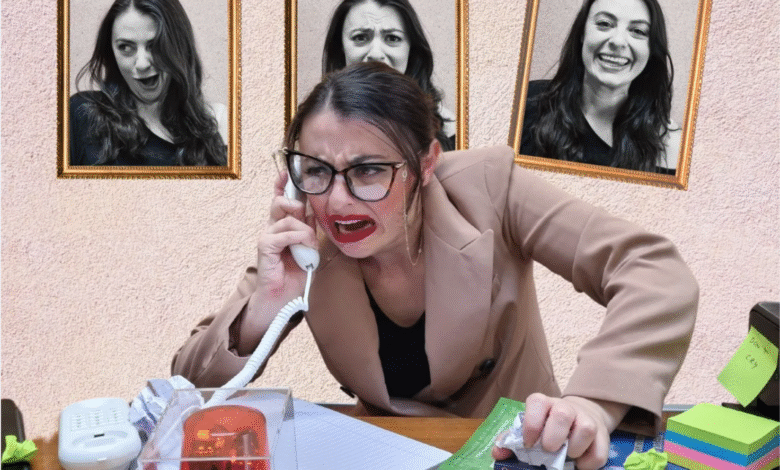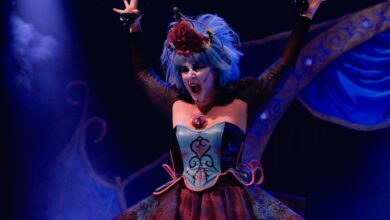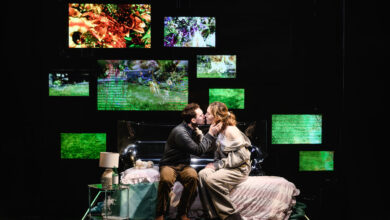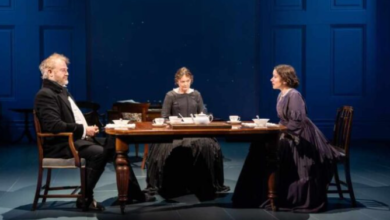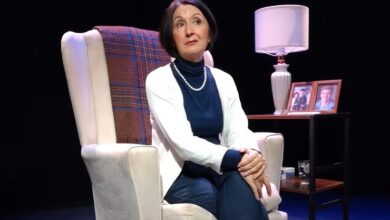Raw and unpolished in places, Bea P. Deigh is also deeply sincere and sharply conceived. Arden Winant delivers a clever and chaotic deep-dive into living with Borderline Personality Disorder. Summary
Rating
Good!
A screen at the back of the room informs us we’re inside the offices of Brain Inc. A desk and a telephone sit to one side. This is the command centre inside Bea P Deigh’s mind.
Bea P. Deigh (Arden Winant) is beginning her first day on the job. She’s clearly tried to dress for success: she’s a little rumpled, wears a shirt that could use ironing, and has a large smear of red lipstick across her face. From the outset, she’s a little unhinged and manic.
The premise is smart and instantly engaging. The Brain is the small, under-resourced office inside all of us, trying to process stimuli and issue coherent responses. Bea P. Deigh, the secretary, is eager to please, but she’s battling chaos both internal and external. What follows is a frantic, fast-paced attempt to keep up with the relentless stream of incoming thoughts, emotions, and demands — a clever metaphor for the reality of living with BPD (Borderline Personality Disorder).
Winant frequently breaks the fourth wall to speak directly to the audience, sharing her real-life diagnosis and personal history. The character’s name is a playful nod to the disorder’s acronym. These interludes are heartfelt and informative, offering not only context but a window into the lived experience of someone with BPD. We learn of her first anxiety attack at 12, hospitalisation following self-harm from age 18, and the long journey toward diagnosis. These moments bring gravity and vulnerability to the otherwise high-octane performance, helping the audience truly grasp how overwhelming even the most mundane tasks can feel.
The performance has a madcap, sometimes exhausting energy: intentionally so. The chaos on stage mirrors the internal struggle: contradictory messages, emotional whiplash, and desperate attempts to function “normally.” One particularly effective scene involves Bea P. Deigh sleeping through multiple alarms. When she tries to get up, her body refuses to obey. She flops around in frustration: a moment that’s both humorous and deeply sad.
Later, in a team-building exercise, she is asked to act out different emotions. It’s a seemingly simple task, but one that sends her spiralling. Her inability to match internal feelings with outward expression is exceptionally frustrating and illustrates just how isolating and frustrating this can be.
A particularly striking moment comes in reference to suicide. Suicide is a symptom of BPD, and Winnant shares that suicidal thoughts are a daily occurrence for her, and yet, she actively wants to live, to find meaningful friendship, to build a future. This contradiction lies at the heart of the condition, and it’s presented with painful honesty. Perhaps we should be open to talking about suicidal thoughts, she suggests to the audience. How else can we address it?
The show ends with a moving visual: a slideshow of childhood photos. Bea P. Deigh speaks gently to her younger self, reassuring her that while the road ahead is hard, she does survive. She does live.
Salt Circle Productions with Arden Winant
You can read more about Bea P. Deigh in our recent interview.
Bea P. Deigh is playing at Studio at The Space Triplex, as part of the Edinburgh Fringe,
until Saturday August 23.


